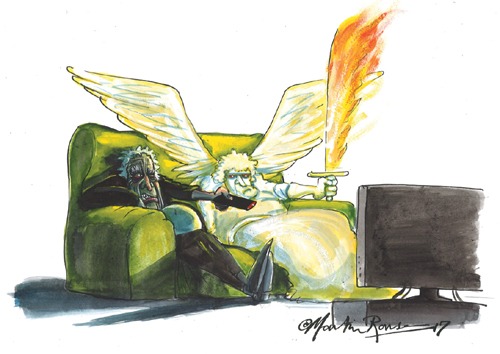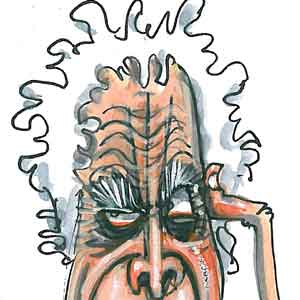
This article is a preview from the Summer 2017 edition of New Humanist. You can find out more and subscribe here.
My father could never quite see the point of going out. Apart from our annual summer holidays to Llandudno or Port Erin in the Isle of Man, I can only remember two occasions on which he and I ever left the house together. There was the one Monday-evening visit to the Corona cinema to see Charlie Chaplin in Monsieur Verdoux and one Saturday-afternoon trip to Goodison Park to watch Everton play Preston North End. And that was it.
I can remember so many occasions when my mother or myself or my two sisters would endeavour to lure him to the cinema or the local park or the beach by dressing up in our going-out clothes and standing in the hallway entreating him to leave his front-room armchair. “Come on, Stan. We’re all going out. The fresh air will do you good. Give you a chance to stretch your legs.”
For much of the time, Dad would merely grunt an acknowledgement of our intentions and stay resolutely where he was. But sometimes, when he felt under particular pressure to move, he’d throw doubt on the whole notion of going out by reciting a litany of potential misfortunes: the weather, the unreliability of Ribble buses, the likely length of the queue at the local cinema, the chance of bumping into one or other of our uncongenial neighbours.
But on one occasion, when the nagging had been particularly intense, he waxed philosophical. “Why on earth do you all want to keep doing things?” he asked as we stood waiting in the hall in our raincoats and sensible shoes. “Why do you want to be moving all the time? Why is going out so much better than not going out?”
Until very recently, I’d always regarded my father’s determined domesticity as an unfortunate pathology. Perhaps, I reasoned, he’d been the first person in his family to own a home of his very own. Perhaps it was a sort of ultimate destination for him, a proof of success, a final resting place.
I only began to suspect that my father’s pathology was far from being so personally distinctive when I realised that I’d taken to watching Pointless five times a week.
This mildly ridiculous quiz game on BBC One, in which contestants are enjoined to think of the least likely answer to questions about sport and showbusiness and popular literature, precedes the Six O’Clock News. But for me, it doesn’t only precede the Six O’Clock News. It also precedes The One Show and East Enders and Holby City and MasterChef. It also precedes the twenty minutes I spend eating my microwaved Dolmio pasta with carbonara sauce and the forty minutes I spend slumbering on the sofa before the arrival of News at Ten and Question Time.
Indeed, it’s no longer Pointless that keeps me at home. It now seems increasingly pointless to go out: the likelihood of rain, the unreliability of buses, the chance of encountering tedious others, the noisiness of restaurants, the interminable length of modern films, the necessity of holding back a cough in the concert hall.
Two nights ago my partner returned home beaming with delight. She and her regular going-out companion had so enjoyed their evening. It had been so very good. So stimulating. I zapped down the volume on Europa League Highlights and made a show of riffling through the fat glossy programme. The Exterminating Angel by Thomas Adès. The old Buñuel film made into an opera. About a bunch of bourgeois dinner guests who find themselves unable to leave the drawing room although there are no visible obstacles to their departure.
In the programme notes, Adès confessed his fascination with the question posed by Bunuel. “Why do we ever do anything? It throws me back on how miraculous it is that we can and must act, indeed that we are alive at all [...] On the one hand Bunuel conveys the impression that the force stopping the guests from leaving lies within themselves, but on the other, with the title, he takes the step of saying: let’s pretend that there is such a supernatural, destructive force, a mythical figure that makes it impossible to act.”
Even as I upped the volume on the Europa League Highlights, I thought how much my father’s constitutional immobility and my own rapidly emerging domestic quiescence were dignified by such a possibility. So much better, so much more reassuring, to blame that damned Exterminating Angel than the unreliability of buses and the imminent prospect of a nasty shower.

